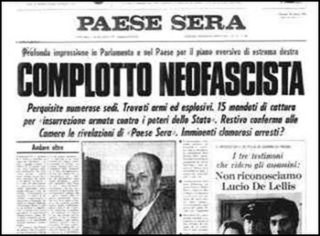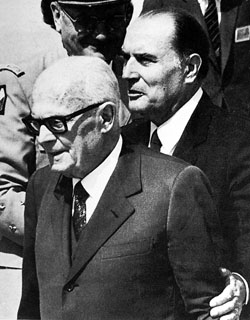 W
WThe Years of Lead is a term used for a period of social and political turmoil in Italy that lasted from the late 1960s until the late 1980s, marked by a wave of both far-left and far-right incidents of political terrorism.
 W
WThe Bologna massacre was a terrorist bombing of the Bologna Centrale railway station in Bologna, Italy, on the morning of 2 August 1980, which killed 85 people and wounded over 200. Several members of the neo-fascist terrorist organization Nuclei Armati Rivoluzionari were sentenced for the bombing, although the group denied involvement.
 W
WFelice Casson is an Italian magistrate and politician, who discovered the existence of Operation Gladio, a "stay-behind" NATO anti-communist army during the Cold War, while investigating on the Peteano bombing in 1972, for which two neo-fascists were convicted; the explosives used in the attack supposedly came from a NATO arms cache. 622 Gladio members, including two people who served as prime minister and president, were exposed in the course of the investigation.
 W
WSergio D'Elia is an Italian politician, activist and former left-wing terrorist, now a human rights' supporter and advocate of non-violence.
 W
WThe Golpe Borghese was a failed Italian coup d'état allegedly planned for the night of 7 or 8 December 1970. It was named after Junio Valerio Borghese, an Italian World War II commander of the Xª MAS unit, convicted of fighting alongside Nazi Germany but not of war crimes, but still a hero in the eyes of many post-War Italian fascists. The coup attempt became publicly known when the left-wing journal Paese Sera ran the headline on the evening of 18 March 1971: Subversive plan against the Republic: far-right plot discovered.
 W
WThe Italicus Express massacre was a terrorist bombing in Italy on a train of the public rail network. During the early hours of August 4th 1974, the bomb attack killed 12 people and wounded 48. Responsibility was claimed by the neo-fascist terrorist organization Ordine Nero.
 W
WOn 27 June 1980, Itavia Flight 870, a McDonnell Douglas DC-9 passenger jet en route from Bologna to Palermo, Italy, crashed into the Tyrrhenian Sea between the islands of Ponza and Ustica, killing all 81 people on board. Known in Italy as the Ustica massacre, the disaster led to numerous investigations, legal actions and accusations, and continues to be a source of controversy, including claims of conspiracy by the Italian government and others. The Prime Minister of Italy at the time, Francesco Cossiga, attributed the crash to being accidentally shot down during a dogfight between Libyan and NATO fighter jets. A 1994 report argued the cause of the crash was a terrorist bomb, one in a years-long series of bombings in Italy. On 23 January 2013, Italy's top criminal court ruled that there was "abundantly" clear evidence that the flight was brought down by a missile, but the perpetrators are still missing.
 W
WThe Mitterrand doctrine was a policy established in 1985 by socialist French president François Mitterrand concerning Italian far-left terrorists who fled to France: those convicted for violent acts in Italy, but excluding "active, actual, bloody terrorism" during the "Years of Lead", would not be extradited to Italy. Mitterrand based this oral promise, which was upheld until the 2000s by France, on the alleged non-conformity of Italian legislation with European standards.
 W
WThe kidnapping of Aldo Moro, also referred in Italy as Moro Case, was a seminal event in Italian political history.
 W
WThe Peteano massacre was a terrorist act of far right political origin committed on May 31, 1972 in Peteano, a fraction of Sagrado (Gorizia) which resulted in the death of three carabinieri and the injury of two others.
 W
WThe Piazza della Loggia bombing was a bombing that took place on the morning of 28 May 1974, in Brescia, Italy during an anti-fascist protest. The terrorist attack killed eight people and wounded 102. The bomb was placed inside a rubbish bin at the east end of the square. In 2015, a Court of appeal in Milan issued a final life sentence to Ordine Nuovo members Carlo Maria Maggi and Maurizio Tramonte for ordering the bombing, closing one of the longest-running cases on terrorism during Italy's years of lead.
 W
WThe Piazza Fontana bombing was a terrorist attack that occurred on 12 December 1969 when a bomb exploded at the headquarters of Banca Nazionale dell'Agricoltura in Piazza Fontana in Milan, Italy, killing 17 people and wounding 88. The same afternoon, three more bombs were detonated in Rome and Milan, and another was found unexploded.
 W
WThe Primavalle fire was an arson which occurred in Rome on 16 April 1973, and which caused the death of the two sons of neo-fascist Movimento Sociale Italiano (MSI) member Mario Mattei.
 W
WThe Red Brigades was a far-left armed organization and guerrilla group based in Italy responsible for numerous violent incidents, including the abduction and murder of former Prime Minister Aldo Moro, during the Years of Lead.
 W
WPietro Valpreda was an Italian anarchist, poet, dancer and novelist.